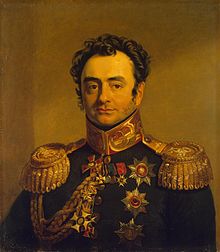Pavel Andreevich Shuvalov
Pawel Andrejewitsch Schuwalow ( Russian Павел Андреевич Шувалов ; born June 1, 1776 , † December 13, 1823 ) was a Russian general and diplomat .
Life
Pavel Andreevich was the second son (after Petrus) of Andrei Petrovich Shuvalov and Ekaterina Petrovna, a daughter of Field Marshal PS Saltykov . In 1786 he joined a guard cavalry regiment of the Russian army as a cornet and was promoted to lieutenant in 1793 . Shuwalow served in 1794 under the command of Alexander Wassiljewitsch Suworow during the Kościuszko uprising in Poland . There he took part in the assault on the Warsaw suburb of Praga . In 1798 he was made a colonel and also served under Suvorov in 1799 during the first coalition war in Italy. When crossing the St. Gotthard he was shot in one knee by a grazing shot. At the age of only 25 he was promoted to major general in 1801 , and three years later he became the commander of a cuirassier regiment . He temporarily held a dragoon regiment in 1806 before getting his old regiment back. In the Fourth Coalition War 1806/07 he commanded the 9th Division under General Pyotr Kirillowitsch Essen . In 1809 he distinguished himself as commander of a corps against Sweden in the Finnish war . Among other things, he managed to take a city by marching across the ice. 8,000 Swedes were captured and numerous guns captured. For this he was appointed adjutant general of the Czar I. Alexander appointed.
In this function he took on several diplomatic missions to Vienna between 1809 and 1811 . During Napoleon's Russian campaign in 1812 , he initially commanded the 4th Corps of the 1st Western Army, but had to give up the post for health reasons. During the wars of liberation he was the tsar's companion on the general staff. He distinguished himself in the battle of Kulm , for which he was awarded the Prussian Iron Cross . He concluded on behalf of Alexander I the truce of pläswitz . After the Battle of the Nations near Leipzig , he received the Order of St. Alexander . He subsequently took part in further battles and in 1814 in the negotiations for the surrender of Paris. After the Allied victory, he escorted the former Empress Marie Louise to Austria and Napoleon to Fréjus .
Even after the war he had the emperor's confidence as a diplomat. After his death, Alexander honored him by attending his funeral.
Museum reception
When Napoleon was escorted from Fontainebleau to the island of Elba , Shuvalov handed over his officer's coat to Napoleon. This "disguise" was a precautionary measure, as attacks on the abdicated French emperor were feared. The coat is exhibited today in the Vienna Army History Museum .
literature
- General German real encyclopedia for the educated classes , Vol. 13, Leipzig, 1847, p. 53
- Alexander Mikaberidze: The Russian Officier Corps of the Revolutionary and Napoleonic Wars 1795-1815 , New York, 2005, pp. 369f.
Individual evidence
- ^ Manfried Rauchsteiner , Manfred Litscher (Ed.): The Army History Museum in Vienna. Graz u. a. 2000, ISBN 3-222-12834-0 , p. 43.
| personal data | |
|---|---|
| SURNAME | Shuvalov, Pavel Andreevich |
| ALTERNATIVE NAMES | Шувалов, Павел Андреевич (Russian spelling) |
| BRIEF DESCRIPTION | Russian general |
| DATE OF BIRTH | June 1, 1776 |
| DATE OF DEATH | December 13, 1823 |
